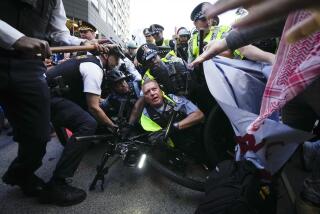100 Federal Agents Watch Voting for Chicago Council
- Share via
CHICAGO — With U.S. Justice Department agents watching, ballot counting continued late Tuesday night in a special election that could cost the once-powerful Chicago Democratic political machine its grip on the City Council for the first time in half a century.
More than 100 assistant U.S. attorneys, FBI agents and U.S. marshals--the largest force of federal agents ever amassed for an election in a Northern city--joined with more than 600 other state and county investigators to police the fiercely contested voting in seven of the city’s 50 districts.
The election in the seven districts had been ordered by a federal court that found that a redistricting of the city after the 1980 census deprived black and Latino majorities of representation on the council.
Local political analysts said the outcome would signal the relative political strength of Mayor Harold Washington and his arch-foe, Democratic machine boss Edward R. Vrdolyak.
The selection of four aldermen--as council members are called in Chicago--loyal to Washington would tip the balance of power in the City Council away from Vrdolyak, giving the politically independent mayor the majority vote that has eluded him since he was elected in 1983.
Washington is Chicago’s first black chief executive and a bloc of 28 white and one Latino councilmen headed by Vrdolyak has thwarted most of the mayor’s legislation and blocked his appointments during Washington’s first three years in office. Vrdolyak also heads the Democratic political organization, often referred to as the Democratic Machine.
The mayor spent the day traveling around the city campaigning while Vrdolyak sent some of his best precinct captains to herd voters.
Rainy, gray weather contributed to a relatively low voter turnout, with less than a third of those eligible going to the polls.
“It’s been very calm,” said Anton R. Valukas, U.S. attorney for the Northern District of Illinois. “We’ve had only one serious complaint of vote fraud and no significant complaints of intimidation,” he said, citing the federal presence as a deterrent to Chicago’s legendary election-day tactics.
The decorum Tuesday was in sharp contrast to events in recent days, when campaign workers were beaten, candidates allegedly received death threats and a bomb was found and defused. In one campaign office, an 18-year-old youth was arrested for allegedly firing three shots at a candidate.
Although Chicago Board of Elections spokesman Tom Leach reported relatively few problems, a state court late Tuesday afternoon ordered several polling places to remain open an extra two hours because of early morning voting delays.
Some locations opened late because of untrained election judges and others were late because ballots were missing.
For example, when Illinois Gov. James R. Thompson went to his Chicago precinct to vote early Tuesday, there were no Republican primary ballots.
“I’ve heard of them trying to steal votes after elections, but I’ve never heard of them stealing ballots before elections,” he said.
More to Read
Sign up for Essential California
The most important California stories and recommendations in your inbox every morning.
You may occasionally receive promotional content from the Los Angeles Times.













